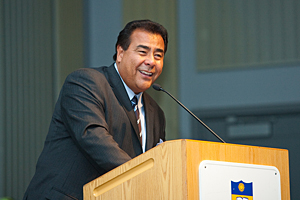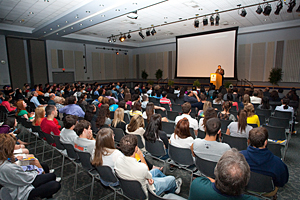
ADVERTISEMENT
- Rozovsky wins prestigious NSF Early Career Award
- UD students meet alumni, experience 'closing bell' at NYSE
- Newark Police seek assistance in identifying suspects in robbery
- Rivlin says bipartisan budget action, stronger budget rules key to reversing debt
- Stink bugs shouldn't pose problem until late summer
- Gao to honor Placido Domingo in Washington performance
- Adopt-A-Highway project keeps Lewes road clean
- WVUD's Radiothon fundraiser runs April 1-10
- W.D. Snodgrass Symposium to honor Pulitzer winner
- New guide helps cancer patients manage symptoms
- UD in the News, March 25, 2011
- For the Record, March 25, 2011
- Public opinion expert discusses world views of U.S. in Global Agenda series
- Congressional delegation, dean laud Center for Community Research and Service program
- Center for Political Communication sets symposium on politics, entertainment
- Students work to raise funds, awareness of domestic violence
- Equestrian team wins regional championship in Western riding
- Markell, Harker stress importance of agriculture to Delaware's economy
- Carol A. Ammon MBA Case Competition winners announced
- Prof presents blood-clotting studies at Gordon Research Conference
- Sexual Assault Awareness Month events, programs announced
- Stay connected with Sea Grant, CEOE e-newsletter
- A message to UD regarding the tragedy in Japan
- More News >>
- March 31-May 14: REP stages Neil Simon's 'The Good Doctor'
- April 2: Newark plans annual 'wine and dine'
- April 5: Expert perspective on U.S. health care
- April 5: Comedian Ace Guillen to visit Scrounge
- April 6, May 4: School of Nursing sponsors research lecture series
- April 6-May 4: Confucius Institute presents Chinese Film Series on Wednesdays
- April 6: IPCC's Pachauri to discuss sustainable development in DENIN Dialogue Series
- April 7: 'WVUDstock' radiothon concert announced
- April 8: English Language Institute presents 'Arts in Translation'
- April 9: Green and Healthy Living Expo planned at The Bob
- April 9: Center for Political Communication to host Onion editor
- April 10: Alumni Easter Egg-stravaganza planned
- April 11: CDS session to focus on visual assistive technologies
- April 12: T.J. Stiles to speak at UDLA annual dinner
- April 15, 16: Annual UD push lawnmower tune-up scheduled
- April 15, 16: Master Players series presents iMusic 4, China Magpie
- April 15, 16: Delaware Symphony, UD chorus to perform Mahler work
- April 18: Former NFL Coach Bill Cowher featured in UD Speaks
- April 21-24: Sesame Street Live brings Elmo and friends to The Bob
- April 30: Save the date for Ag Day 2011 at UD
- April 30: Symposium to consider 'Frontiers at the Chemistry-Biology Interface'
- April 30-May 1: Relay for Life set at Delaware Field House
- May 4: Delaware Membrane Protein Symposium announced
- May 5: Northwestern University's Leon Keer to deliver Kerr lecture
- May 7: Women's volleyball team to host second annual Spring Fling
- Through May 3: SPPA announces speakers for 10th annual lecture series
- Through May 4: Global Agenda sees U.S. through others' eyes; World Bank president to speak
- Through May 4: 'Research on Race, Ethnicity, Culture' topic of series
- Through May 9: Black American Studies announces lecture series
- Through May 11: 'Challenges in Jewish Culture' lecture series announced
- Through May 11: Area Studies research featured in speaker series
- Through June 5: 'Andy Warhol: Behind the Camera' on view in Old College Gallery
- Through July 15: 'Bodyscapes' on view at Mechanical Hall Gallery
- More What's Happening >>
- UD calendar >>
- Middle States evaluation team on campus April 5
- Phipps named HR Liaison of the Quarter
- Senior wins iPad for participating in assessment study
- April 19: Procurement Services schedules information sessions
- UD Bookstore announces spring break hours
- HealthyU Wellness Program encourages employees to 'Step into Spring'
- April 8-29: Faculty roundtable series considers student engagement
- GRE is changing; learn more at April 15 info session
- April 30: UD Evening with Blue Rocks set for employees
- Morris Library to be open 24/7 during final exams
- More Campus FYI >>
2:20 p.m., Sept. 22, 2010----John Quinones says he believes that the doors to high profile careers in the news media, especially broadcast journalism, are now open to individuals of all ethnic backgrounds.
Quiñones, co-anchor and correspondent for ABC's Primetime and 20/20, made his remarks to an audience of more than 600 during “A 20/20 View of Hispanic America,” the opening event of Latino Heritage Month 2010 at the University of Delaware, held Tuesday evening, Sept. 21, in the Trabant University Center.
“I speak all over the country with the same message of inspiration,” Quiñones said. “I want you to know that I have been there and that if I can make it to network television, so can you -- just dream big.”
In tracing his own route to a quarter-century of experience in broadcast journalism, the Emmy Award-winning journalist noted that Latinos of his generation were not encouraged to attend college, let alone pursue high profile careers such as those earned and enjoyed by individuals such as Dan Rather, Walter Cronkite, Barbara Walters and his friend, the late Peter Jennings of ABC World News.
“Some people say that 'we were poor, but we didn't know it,'” Quiñones said. “We knew it. On Saturdays, as a child in San Antonio, Texas, I would go out with my dad to mow lawns or with my mother to clean houses on the rich side of town.”
Quiñones, said that even though his family was fifth generation American, fellow Hispanics in his school were steered towards lives of manual labor instead of college and professional careers.
“They thought that all of those 'Mexican' kids were not capable of going to college,” Quiñones said. “Thanks to the Upward Bound program I was able to attend college preparation classes on Saturday mornings, and I eventually attended St. Mary's University in San Antonio.”
Growing up picking cherries in Michigan and tomatoes in Ohio also had an influence on his determination to overcome the Hispanic stereotyping and the rough neighborhood in which he grew up, Quiñones said.
“When I looked at the rows of tomatoes in Ohio that never seemed to end, my father asked me if I wanted to be working as hard as he had been working,” Quiñones said. “I told my father that I didn't want to do that kind of work, and that I was going to go to school.”
While attending St. Mary's University in 1973, Quiñones started working as a reporter and announcer at KTSA radio, the first of many radio jobs before attending the Columbia University School of Journalism, where he earned a master's degree in 1979.
“You have to take advantage of every opportunity you get. I applied to Columbia and received a fellowship,” Quiñones said. “While at Columbia I met the president of CBS and told him I wanted to interview him for my thesis. I also told him that I was graduating in May. I was pushing and pushing all the time, and I ended up with a job in Chicago, which was almost unheard of for somebody just starting out in television in one of the biggest markets in the United States.”
Quiñones noted that his Latino background helped him during the 1980s, when he used his base in Miami, Fla., to cover stories that included the civil war in El Salvador, the Challenger space shuttle disaster in 1986 and the U.S. invasion of Panama in 1989.
Among the biggest issues facing the Hispanic community today is the question of immigration, Quiñones said.
“There is no easy answer to the immigration issue,” Quiñones said. “We just can't open the gates to everybody, but we can't deport 11 million people. We have to get real about this.”
Quiñones said he also believes that education is the key to improving the lives of the coming generations of Latino youth and that the role of journalism is to educate Americans about what is happening in their community and around the world.
“Journalism is like a flashlight that you shine on the darkest corners of the world,” Quiñones said. “We give a voice to the voiceless.”
Article by Jerry Rhodes
Photos by Kevin Quinlan



